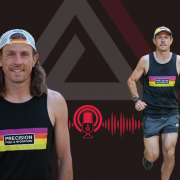Individualisation and Modification of Training Based on Readiness and Individual Responses to Stimulus With Rewire
With each passing month there is more and more evidence in support of the use of HRV guided training for athletes. Part of this is driven by the increasing interest in HRV as a measure in health and performance, but part of it is also probably due to the intrinsic ‘sense’ it makes. That is; not everyone adapts to the same stimulus the same way and everyone deals with life stressors differently. In fact, if you speak to most coaches these phenomena are deeply ingrained in their understanding of adaptation, the challenge has been how to quantify this and adapt as a result.
This was the basis for Rewire’s readiness tracking. It was built on the concept of blending both objective physiological parameters with subjective and emotional factors, which is still quite unique in the industry. As is the appreciation of the two and their impact on eachother, perhaps due to modern culture’s mind-body dissociation.
To this point, a bulk of the research regarding HRV guided training has used HRV as the sole measure to adjust training (either in an acute time frame with acute changes to HRV or a longer term time frame based on longer term trends) and has mostly cut back or reduced training intensity based on this. In reality many coaches would likely integrate subject measures with these sorts of objective measures such as resting heart rate and HRV as well as modify training in more ways than just reducing load on days of poor readiness.
A recent study from Nuuttila Olli-Pekka and colleagues has taken a very coach oriented view on readiness when it comes to HRV guided training.
The basics of the study:
- Runners were split into two groups, one followed a set program and one adjusted training around their HRV, heart rate-running speed index (a measure of the relationship of running speed to heart rate) and subjective measures of readiness.
- In the group who adjusted training, this was done twice a week and saw either an increase, maintenance or decrease in training based on the measures mentioned.
- This is of specific note given usually HRV guided training studies use only low HRV to reduce training load, not the opposite.
- They trained for 15 weeks, with pre and post intervention testing
- Top speed on a treadmill and 10km time trial were the outcome measures
What they found:
- All runners improved
- The magnitude of improvement was greater for the group with modified training in the 10km time trial
- The proportion of high responders (those who had significantly larger improvements) was more in the modified training group (50% vs 29%)
- The modified training group had fewer low responders (0% vs 21%)
Some thoughts and takeaways:
- Generally training improves performance, so the global improvement is expected but the difference in the groups is key
- Using modified training had greater upside (high responders) and lower downside (low responders), crucially there were no non-responders
So to summarize, modifying training to match readiness showed increased performance and improved all participants’ performance. This is very rare in any intervention, let alone one that only takes a few minutes!
If this, in combination with the fact that Rewire both tracks these metrics and provides actionable insights around modification of training and preparation for training on different days, doesn’t make you want to use Rewire then the next study will help really cement this.
Jens Voet and colleagues’ 2021 paper showed the disconnect between the training prescription of the coach and the way this was executed by the athletes (in this case, semi-professional cyclists) with respect to RPE. This difference was significant, and importantly, differed between individuals. It likely reflects, at least in part, the disconnect between prescription of external workloads and training responses they induce (internal workloads).
To simplify, the intention of the coach when prescribing sessions was rarely the reality, and the magnitude of this difference was individual between athletes. Again, for most coaches this probably makes some sense upon reflection. But the challenge is quantifying this gap and the bigger challenge is adapting things going forward to the athlete.
Enter Rewire.
The algorithm used in readiness tracking by Rewire adapts to you in that your individual variation is scaled based on your normal ranges, because everyone’s responses differ.
This readiness measurement drives mindset recovery and pre-workout priming recommendations to help you get the most out of training or indeed recover better for the day. That’s right, Rewire provides actions to take based on readiness, not just a readiness score for you to try and understand.
Additionally, the gap between intended session difficulty and actual difficulty is currently tracked when undertaking Neuro-training and is something that is in the roadmap for inclusion at a later date for the coaches dashboard for other training sessions.
So with this in mind, why not start your Elite trial of Rewire today?
Don’t forget, Rewire is about more than just readiness tracking and pre-training preparation! Recovery sessions are prescribed thanks to integrations such as Garmin and Strava because training is about repeated efforts over weeks and months, not just every now and then. This is all without mention of Rewire’s key mental fitness focused Neuro-training, which improves mental endurance.
References:
Olli-Pekka N, Ari N, Elisa K, Keijo H, Heikki K. Individualized Endurance Training Based on Recovery and Training Status in Recreational Runners. Med Sci Sports Exerc. 2022 Aug 13. doi: 10.1249/MSS.0000000000002968. Epub ahead of print. PMID: 35975912.
Jens G. Voet, Robert P. Lamberts, Jos J. de Koning, Jelle de Jong, Carl Foster & Teun van Erp (2021) Differences in execution and perception of training sessions as experienced by (semi-) professional cyclists and their coach, European Journal of Sport Science, DOI: 10.1080/17461391.2021.1979102
This indicates that the relationship between RPE and iRPE is unique to each cyclist. Both the different execution and perception of the training programme by the individual cyclists could cause an impaired training adaptation.












